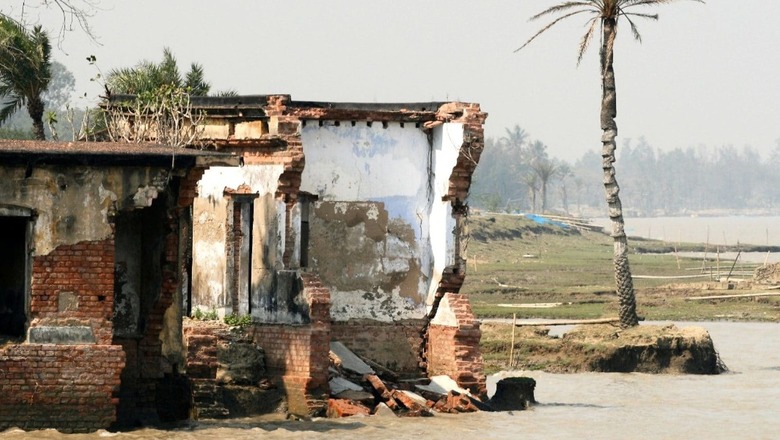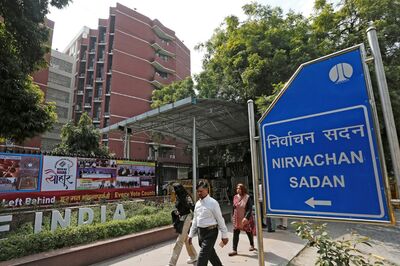
views
On World Environment Day, a new report has revealed alarming facts about where India stands amid the rising global threat of climate change. After blistering in heatwave conditions for the past three months, there is more bad news in store.
Five states and two union territories are under threat from a rise in water spread.
Over a third of India’s coastline witnessed some degree of erosion between 1990 and 2018.
Three out of every four river-monitoring stations in the country have recorded alarming levels of heavy toxic metals.
The entire forest cover of the country is likely to become a climate hotspot.
India recycled 12 per cent and burnt 20 per cent of the 3.5 million tonnes of plastic waste it generated in 2019-20.
Data published in the report ‘State of India’s environment 2022: In figures’ by Centre for Science and Environment (CSE) states that 25 glacial lakes and water bodies in India, China and Nepal have recorded over 40 per cent rise in their water spread areas since 2009, posing a grave threat to five Indian states and two union territories: Assam, Arunachal Pradesh, Sikkim, Bihar, Himachal Pradesh, Jammu and Kashmir, and Ladakh.
This is not all. India’s coastal erosion is equally concerning. The report stated that over a third of India’s coastline witnessed some degree of erosion between 1990 and 2018. West Bengal is the worst hit with over 60 per cent of its shoreline under erosion. Increase in frequency of cyclones and rise in sea levels, and activities such as construction of harbours and dams, as well as beach mining are some reasons for coastal erosion, it said.
The report makes use of government data to show that lead, iron, nickel, cadmium, arsenic, chromium and copper are some of the heavy metals polluting the country’s rivers. It said high levels of two or more toxic metals have been reported by one-fourth of the river-monitoring stations, spread across 117 rivers and tributaries.
When it comes to the national river Ganga, 10 out of 33 monitoring stations in the river have reported high contaminant levels. The river, which is considered sacred by majority of Indians, is being cleaned under the central government’s flagship programme Namami Gange. The project has a budget outlay of over Rs 20,000 crore.
A climate hotspot refers to an area that is likely to face severe impacts of climate change. The report stated that 45 to 64 per cent of the country’s forest cover is likely to become climate hotspots by 2030. “The severity, in terms of damage due to climate change, is set to increase in 2085,” the CSE report stated.
The report also said while India recycled 12 per cent and burnt 20 per cent of the 3.5 million tonnes of plastic waste generated in 2019-20, there is no information on what happened to the remaining 68 per cent. It said it is most likely that the waste would have ended up in dumpsites and landfills.
‘One Earth, many efforts’: PM Modi coins slogan for ‘Mission LiFE’
Prime Minister Narendra Modi, meanwhile, launched his global initiative ‘Lifestyle for the Environment (LiFE) Movement’ on Sunday, saying its vision is to live a lifestyle in tune with the planet; one that does not harm it.
“Those who live such a lifestyle are called pro-planet people,” Modi said in a video address, adding that ‘Mission LiFE’ borrows from the past, operates in the present and focuses on the future. He coined the slogan ‘One Earth, many efforts’ for the movement and said India was ready to lend its support to make the environment better and improve global wellness.
Modi said the planet’s challenges were well-known, and the need of the hour was human-centric, collective effort and robust action that promoted sustainable development. “Reduce, reuse and recycle are the concepts woven in our life. Circular economy has been an integral part of our culture and lifestyle,” the prime minister said.
He added: “Mahatma Gandhi talked about a zero-carbon lifestyle. In our daily life choices, let us pick the most sustainable options. Let us follow the principle of reuse, reduce and recycle. Our planet is one but our efforts have to be many. One earth, many efforts,” he said.
Modi said India was making an effort to increase forest cover population of endangered species such as lions, tigers, leopards, elephants and rhinos.
“Our commitment to reach 40 per cent of installed electric capacity from non-fossil fuel-based sources has been achieved, nine years ahead of schedule. We have achieved 10 per cent ethanol blending in petrol, five months ahead of the November 2022 target. This is a major accomplishment given that blending was hardly 1.5 per cent in 2013-14 and 5 per cent in 2019-20.”
‘Water, air greatest gifts’
National Green Tribunal chairperson Justice Adarsh Kumar Goel on Sunday said water and air were the greatest gifts to mankind. “World Environment Day is a reminder to all of us to protect our precious and pristine environment. The greatest gift to mankind and other life is water and air, which each of us needs to conserve,” he said.
“Let us once again commit to protect water sources, use them appropriately and maintain their cleanliness. We can’t afford to either lose or degrade them as such loss cannot be made out by any monetary cost,” the NGT chairperson said, adding that there were massive gaps in compliance of environment rules and the higher authorities were not adequately concerned.
(With PTI inputs)
Read all the Latest India News here




















Comments
0 comment